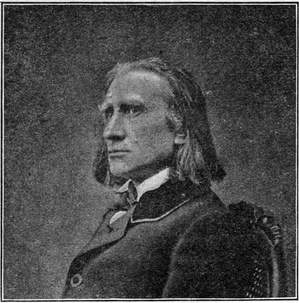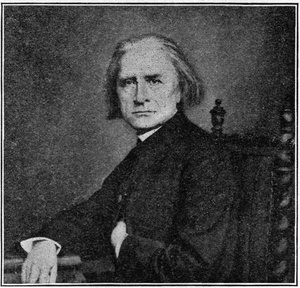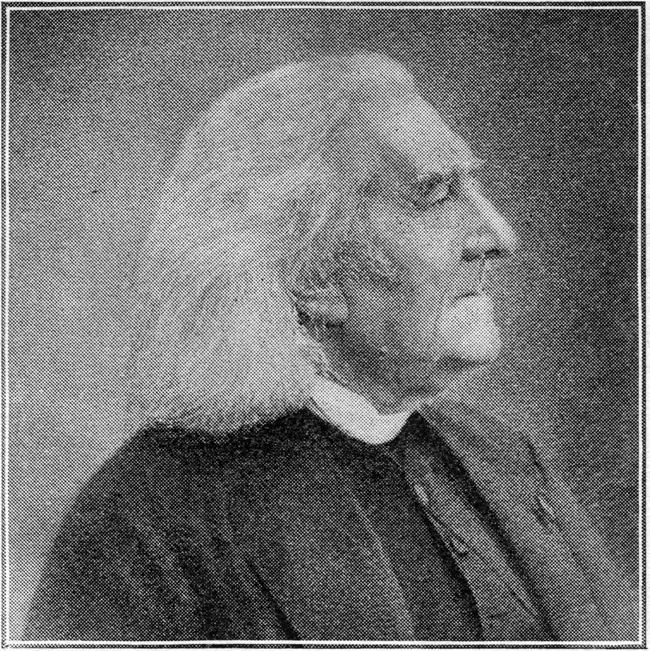By CONSTANTIN VON STERNBERG.
 We have here in America a great foible for selecting some one phase of a complex matter and for comparing kindred matters by the standard of this phase, whether it be an important or irrelevant one. It suits my present purpose to appeal to this foible; to pick out a—seemingly—irrelevant phase of Liszt’s life for no other purpose than to be able to say that in this respect he was “the greatest in the world.”
We have here in America a great foible for selecting some one phase of a complex matter and for comparing kindred matters by the standard of this phase, whether it be an important or irrelevant one. It suits my present purpose to appeal to this foible; to pick out a—seemingly—irrelevant phase of Liszt’s life for no other purpose than to be able to say that in this respect he was “the greatest in the world.”
It may help the reader to form an estimate of one of Liszt’s chief characteristics if I say that he was the most loved man in history. He was loved by more people than any man I ever heard of, and I think I have not overlooked anybody of consequence in history; he was loved more devotedly, more affectionately, demonstratively, and more enduringly. This statement seems sweeping, or rash, but it is made in good faith, and with very little fear of successful contradiction. Not only was he loved by all who had the enviable privilege of his personal acquaintance, but also by those who merely formed the audience in his concerts; for there was in his playing an indescribable personal charm which needed but a short time to transform the listener’s artistic admiration into outright personal affection. Everyone who heard him play was, somehow, deluded into the belief that Liszt had played for him in particular, had told him all about his lofty life-philosophy, his ideals, his altruism, and had successfully coaxed him over to share his views.
Tall, of commanding appearance, learned, wise in more ways than one, utterly fearless, he was as strong of brawn as of brain, yet simple as are all great men, and a past-master of tact. Over all these virtues, however, presided a large, warm, generous, all-humanity-embracing heart, a heart that could suffer and rejoice with others like that of a woman of the highest, noblest type. As to his mental and psychical attitude toward the young, poor, struggling, aspiring student, we need only say that his strangely serious, benevolent, and kind smile went right down to the student’s heart and banished, as if by magic, all trepidation and embarrassment. The love-power of Liszt’s heart was unparalleled among mortals, as his generous zeal in behalf of his contemporaries—Chopin, Berlioz, Wagner, and Schumann —demonstrates plainly enough. And, however well this love-power was held in check by his fine breeding and broad education, it would crop out in a thousand delicate ways, which disarmed and conquered even the sternest, coldest natures and compelled the response of feelings in them that may have lain dormant far, far beyond the range of mere admiration and respect, and which cannot be called but, in the purest sense, love.
 For the worship of the letter as a musical credo Liszt had neither time nor patience. He had delved deeply into the mysteries of musical art. Whatever reading and learning can disclose to a human mind, it lay before him like an ever-open reference-book; but past and beyond this stupendous store of knowledge he possessed a spiritual penetration that could have no other source but the love he felt for the writers and their works. He loved fine compositions with equal enthusiasm, whether he had written them himself or anyone else had done so.
For the worship of the letter as a musical credo Liszt had neither time nor patience. He had delved deeply into the mysteries of musical art. Whatever reading and learning can disclose to a human mind, it lay before him like an ever-open reference-book; but past and beyond this stupendous store of knowledge he possessed a spiritual penetration that could have no other source but the love he felt for the writers and their works. He loved fine compositions with equal enthusiasm, whether he had written them himself or anyone else had done so.
I suspect that his stupendous erudition in the works of the old Italian school was acquired after his fortieth year, and was brought about through his sojourn in Rome, where he became a great favorite of Pope Pius IX and enjoyed the freedom of the Vatican libraries. Rummaging among the old manuscripts of Palestrina, Allegri, Rossi, Vittoria, et al., he discovered for himself the treasures of past ages, familiarized himself with the modes and chants of Gregory and Ambrose, and learned well to understand the importance of the letter. But he also learned to penetrate beyond it; he saw clearly that thought, enduring thought, being in advance of its time, must needs also be prophetic beyond such means of graphic or instrumental demonstration as the times possess. Hence, wherever he found a composer’s work suffering under the limitations of the notation or instruments of its time, or, in other words, where he found that, owing to the paucity of means to express himself, a master had meant more than he could say, more than the average mortal could suspect, Liszt never hesitated to employ such additional means of expression as his own time and genius commanded, and which aided the musician to appreciate more fully the power and beauty of a master’s thought. He did not hesitate, for instance, to do for Schubert what modern literature has done for Chaucer, and just as Chaucer was translated into modern English, not because his works needed any improvement, but to aid the reader’s appreciation, so did Liszt give to Schubert’s piano-works (Cotta edition) the benefit of the vocabulary of the modern piano.
How well he loved Schubert’s works! And how reverently he loved them! His reverence speaks out of every page! It speaks clearly enough out of the pages he left untouched, for his self-restraint is truly masterful; but it speaks still plainer in the suggestions he did make; for they are so delicate, so respectful of the essence of the work, so unmistakably confined to mere auxiliaries, to matters of little careless negligence on the author’s part or appertaining to the limitations of the piano of Schubert’s day, that none but a narrow-minded letter- worshiper could find fault with them.
Yes, he worshiped the spirit of a master’s work! If the letter expressed it adequately, he felt it at once and strictly adhered to that letter. Bach, for instance, he never touched with the editorial pen (and he was a profound Bach scholar), for his transcriptions of the organ-fugues cannot come under that head. But when he played Beethoven he did, here and there, resort to an occasional doubling of the bass, or to make a chord more full if the climax required it. In stormy passages of broken octaves in both hands (like in the two closes of the first Allegro in the Sonata in C, op. 2, No. 3) he always took alternating double octaves. It is more in keeping with the modern piano and produces the palpably intended brilliant effect much better.
He objected seriously to the deducing of a law or rule from such little liberties. “It must come of itself, because you feel like doing it; otherwise stick to the text!” Such was his frequent admonition and he was especially impressive with this advice when he dealt with one of those small-caliber fellows who saw his whole greatness only in such trifling things and who would quote as a precedent what had occurred to him only at the spur of the moment, or who would charge to the teacher in him what the artist of genius had suggested.
Still, when dealing with those of whom he believed that they understood him, he went a goodly distance into the realm of freedom. Never so far as to alter the spirit, even of the smallest sentence; but he often did play things as he thought that “Beethoven would surely have written them, had he written in our day.”
In modern music he used his freedom in the widest measure. Being beyond any possible question the prince of all piano-players of his time and surely also of all his contemporary piano-writers, he was a perfect Sherlock Holmes in detecting where, either through inexperience or oversight, an author had done injustice to his own thought; where a climax required a short prolongation to lead more satisfactorily to a grand pause, or to a great outburst; where a harmonic nicety, justified and required by kindred ones in the piece, or by the author’s general style and manner had eluded his notice; where a little embroidery of the Chopin type was either too clumsy or stiff, or too flimsy for the occasion; where the author was negligently inconsistent in phrasing the derivatives of, or the allusions to, his own main subjects.
To new students he would, of course, point out such stylistic defects in the modern compositions they played; he would show plainly the esthetic necessity of “taking the due liberty of undoing the author’s undue liberty”; but later on he merely suggested things, and finally left these matters to the students’ own discernment, correcting them where they erred and regarding their occasional mistakes rather as errors of judgment than as artistic crimes.
“If, in the study of a work, a change in a minor detail seems necessary to you, your acquaintance with the work must have grown intimate, for it is only good, close friends whose faults we try and dare to correct. As for playing the notes as printed—any fool can do that.”
And he practiced what he preached! In his own compositions he allowed his students more liberties than in those of any other author. Of course, he sized up his man; but, once convinced of his good taste, he would grant him the greatest possible freedom of conception. It was a sort of “mot” among the young folks that “you’ve got to do something with his own compositions; he likes it.”
As I think of this emancipated musical thinker there comes to mind an incident bearing on the subject:
Some time ago I argued on the point of Liszt’s liberal views with a rather well-known musician. Reluctantly at first, but with gradually growing conviction, he admitted the justice of Liszt’s views until he declared himself conquered and converted on every point; but so strong was the force of pedagogic habits in him that he could not help saying at the end: “Well, yes, I admit that Liszt is right (in his Schubert edition), point for point, but, my dear sir, these things you may do—but they must not be written down black on white!” And when I reminded him that Art is free and granted no patents and mortgages upon ideas, when I argued that a conviction strong enough to be expressed in public playing must be strong enough to bear the test of public print, he struggled just for a moment, and stretching out his hand to me, said: “You are right! I guess I was getting old.”




